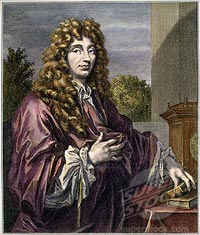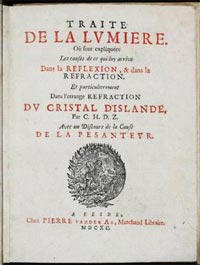


Christiaan Huygens
Den Haag 1629 - 1695
Dutch mathematician, physicist, astronomer and optician. He studied law and mathematics at the University of Leiden from 1645 to 1647. He became a member of the Royal Society in 1663 and in 1666 of the Académie Royale des Sciences. He was among the founders of new science; despite reluctance to publish large part of his studies on the centripetal, hydrostatic and optical forces, he was among the most important figures of his time in the field of natural studies. He was in contact with Descartes, Mersenne, Pascal and, later, with the majority of the philosophers and naturalists of his time, including Gassendi, Roberval, Leibniz and Newton.
Main works: Theoremata de quadratura hyperboles (1651); De ratiociniis in ludo aleae (1656); Systema Saturnium (1659); Horologium Oscillatorium sive de motu pendulorum (1673); Traité de la lumière: avec, un discours de la pesanteur (1690).
Bibliography: H.L. Brugmans, Le Séjour de Christian Huygens à Paris et ses relations avec les milieux scientifiques français, Paris, Droz 1935; A.E. Bell, Christiaan Huygens and the Development of Science in the Seventeenth Century, London-New York, Arnold and Longmans 1947; E.J. Dijksterhuis, Christiaan Huygens, Haarlem, Bohn 1951; H.J.M. Bos, et al. (eds.), Studies on Christiaan Huygens, Lisse, Swets and Zeitlinger 1980; Huygens et la France, avant propos de R. Taton, Paris, Vrin 1982; A. D’Elia, Christiaan Huygens. Una biografia intellettuale, Milano, Franco Angeli 1985; G. Mormino, "Penetralia motus". La fondazione relativistica della meccanica in Christiaan Huygens, con l’edizione del "Codex Hugeniorum 7A", Firenze, La Nuova Italia 1993; C.D. Andriesse, Titan kan niet slapen: Een biografie van Christiaan Huygens, Amsterdam, Contact 1993.